- Home
- Niccolò Ammaniti
I'm Not Scared
I'm Not Scared Read online
This book is dedicated to my sister Luisa,
who followed me on the Nera
with her little silver star
pinned to her jacket.
That much he knew. He had fallen into darkness. And at the instant he knew, he ceased to know.
Jack London
Contents
Title Page
Dedication
Chapter One
Chapter Two
Chapter Three
Chapter Four
Chapter Five
Chapter Six
Chapter Seven
Chapter Eight
Chapter Nine
Chapter Ten
Copyright
One
I was just about to overtake Salvatore when I heard my sister scream. I turned and saw her disappear, swallowed up by the wheat that covered the hill.
I shouldn’t have brought her along. Mama would be furious with me.
I stopped. I was sweaty. I got my breath back and called to her: ‘Maria? Maria?’
A plaintive little voice answered me: ‘Michele.’
‘Have you hurt yourself?’
‘Yes, come here.’
‘Where’ve you hurt yourself?’
‘On the leg.’
She was faking, she was tired. I’m going on, I said to myself. But what if she really was hurt?
Where were the others?
I saw their tracks in the wheat. They were rising slowly, in parallel lines, like the fingers of a hand, towards the top of the hill, leaving a wake of trampled stalks behind them.
The wheat was high that year. In late spring it had rained a lot, and by mid-June the stalks were higher and more luxuriant than ever. They grew densely packed, heavy-eared, ready to be harvested.
Everything was covered in wheat. The low hills rolled away like the waves of a golden ocean. As far as the horizon nothing but wheat, sky, crickets, sun and heat.
I had no idea how hot it was, degrees centigrade don’t mean much to a nine-year-old, but I knew it wasn’t normal.
That damned summer of 1978 has gone down in history as one of the hottest of the century. The heat got into the stones, crumbled the earth, scorched the plants and killed the livestock, made the houses sweltering. When you picked the tomatoes in the vegetable garden they had no juice and the zucchini were small and hard. The sun took away your breath, your strength, your desire to play, everything. And it was just as unbearable at night.
At Acqua Traverse the grown-ups didn’t leave the houses till six in the evening. They shut themselves up indoors with the blinds drawn. Only we children ventured out into the fiery deserted countryside.
My sister Maria was five and followed me as stubbornly as a little mongrel rescued from a dog pound.
‘I want to do what you do,’ she always said. Mama backed her up.
‘Are you or are you not her big brother?’ And there was nothing for it, I had to take her along.
No one had stopped to help her.
After all, it was a race.
‘Straight up the hill. No curves. No following each other. No stopping. Last one there pays a forfeit,’ Skull had decided and he had conceded to me: ‘All right, your sister’s not in the race. She’s too small.’
‘I’m not too small!’ Maria had protested. ‘I want to race too!’ And then she had fallen down.
Pity, I was lying third.
First was Antonio. As usual.
Antonio Natale, known as Skull. Why we called him Skull I can’t remember. Maybe because once he had stuck a skull on his arm, one of those transfers you bought at the tobacconist’s and fixed on with water. Skull was the oldest in the gang. Twelve years old. And he was the chief. He liked giving orders and if you didn’t obey he turned nasty. He was no Einstein, but he was big, strong and brave. And he was going up that hill like a goddamn bulldozer.
Second was Salvatore.
Salvatore Scardaccione was nine, the same age as me. We were classmates. He was my best friend. Salvatore was taller than me. He was a loner. Sometimes he came with us but often he kept to himself. He was brighter than Skull, and could easily have deposed him, but he wasn’t interested in becoming chief. His father, the Avvocato Emilio Scardaccione, was a big shot in Rome. And had a lot of money stashed away in Switzerland. That’s what they said, anyway.
Then there was me, Michele. Michele Amitrano. And I was third that time, yet again. I had been going well, but now, thanks to my sister, I was at a standstill.
I was debating whether to turn back or leave her there, when I found myself in fourth place. On the other side of the ridge that duffer Remo Marzano had overtaken me. And if I didn’t start climbing again straight away Barbara Mura would overtake me too.
That would be awful. Overtaken by a girl. And a fat one too.
Barbara Mura was scrambling up on all fours like a demented sow. All sweaty and covered in earth.
‘Hey, aren’t you going back for your little sister? Didn’t you hear her? She’s hurt herself, poor little thing,’ she grunted happily. For once it wasn’t going to be her who paid the forfeit.
‘I’m going, I’m going … And I’ll beat you too.’ I couldn’t admit defeat to her just like that.
I turned and started back down, waving my arms and whooping like a Sioux. My leather sandals slipped on the wheat. I fell down on my backside a couple of times.
I couldn’t see her. ‘Maria! Maria! Where are you?’
‘Michele …’
There she was. Small and unhappy. Sitting on a ring of broken stalks. Rubbing her ankle with one hand and holding her glasses in the other. Her hair was stuck to her forehead and her eyes were moist. When she saw me she twisted her mouth and swelled up like a turkey.
‘Michele?’
‘Maria, you’ve made me lose the race! I told you not to come, damn you.’ I sat down. ‘What have you done?’
‘I tripped up. I hurt my foot and …’ She threw her mouth wide open, screwed up her eyes, shook her head and exploded into a wail: ‘My glasses! My glasses are broken!’
I could have thumped her. It was the third time she had broken her glasses since school had finished. And every time, who did mama blame?
‘You’ve got to look after your sister, you’re her big brother.’
‘Mama, I …’
‘I don’t want to hear any of your excuses. It hasn’t sunk into your head yet, but I don’t find money in the vegetable garden. The next time you break those glasses I’ll give you such a hiding …’
They had snapped in the middle, where they had already been stuck together once before. They were a write-off.
Meanwhile my sister kept on crying.
‘Mama … She’ll be cross … What are we going to do?’
‘What else can we do? Stick them together with Scotch tape. Up you get, come on.’
‘They look horrible with Scotch tape. Really horrible. I don’t like them.’
I put the glasses in my pocket. Without them my sister couldn’t see a thing, she had a squint and the doctor had said she would have to have an operation before she grew up. ‘Never mind. Up you get.’
She stopped crying and started sniffing. ‘My foot hurts.’
‘Where?’ I kept thinking of the others, they must have reached the top of the hill ages ago. I was last. I only hoped Skull wouldn’t make me do too tough a forfeit. Once when I had lost a bike race he had made me run through nettles.
‘Where does it hurt?’
‘Here.’ She showed me her ankle.
‘You’ve twisted it. It’s nothing. It’ll soon stop hurting.’
I unlaced her trainer and took it off very carefully. As a doctor would have done. ‘Is that better?’
‘A bit. Sh
all we go home? I’m terribly thirsty. And mama …’
She was right. We had come too far. And we had been out too long. It was way past lunchtime and mama would be on the lookout at the window.
I wasn’t looking forward to our return home.
But who would have thought it a few hours earlier.
That morning we had gone off on our bikes.
Usually we went for short rides, round the houses. We cycled as far as the edges of the fields, the dried-up stream, and raced each other back.
My bike was an old boneshaker, with a patched-up saddle, and so high I had to lean right over to touch the ground.
Everyone called it ‘the Crock’. Salvatore said it was the bike the Alpine troops had used in the war. But I liked it, it was my father’s.
If we didn’t go cycling we stayed in the street playing football, steal-the-flag, or one-two-three-star, or lounged under the shed roof doing nothing.
We could do whatever we liked. No cars ever went by. There were no dangers. And the grown-ups stayed shut up indoors, like toads waiting for the heat to die down.
Time passed slowly. By the end of the summer we were longing for school to start again.
That morning we had been talking about Melichetti’s pigs.
We often talked about Melichetti’s pigs. Rumour had it old Melichetti trained them to savage hens, and sometimes rabbits and cats he found by the roadside.
Skull spat out a spray of white saliva. ‘I’ve never told you till now. Because I couldn’t say. But now I will tell you: those pigs ate Melichetti’s daughter’s dachshund.’
A general chorus arose: ‘No, they couldn’t have!’
‘They did. I swear on the heart of the Madonna. Alive. Completely alive.’
‘It’s not possible!’
What sort of monsters must they be to eat a pedigree dog?
Skull nodded. ‘Melichetti threw it into the pigsty. The dachshund tried to get away, they’re crafty animals, but Melichetti’s pigs are craftier. Didn’t give him a chance. Torn to shreds in two seconds.’ Then he added: ‘Worse than wild boars.’
Barbara asked him: ‘But why did he throw it to them?’
Skull thought for a moment. ‘It pissed in the house. And if you fall in there, you fat lump, they’ll strip all the flesh off you, right down to the bone.’
Maria stood up. ‘Is Melichetti crazy?’
Skull spat on the ground again. ‘Crazier than his pigs.’
We were silent for a few moments imagining Melichetti’s daughter with such a wicked father. None of us knew her name, but she was famous for having a sort of iron brace round one leg.
‘We could go and see them!’ I suggested suddenly.
‘An expedition!’ said Barbara.
‘It’s a long way away, Melichetti’s farm. It’d take ages,’ Salvatore grumbled.
‘No, it isn’t, it’s not far at all, let’s go …’ Skull got on his bike. He never missed a chance to put Salvatore down.
I had an idea. ‘Why don’t we take a hen from Remo’s chicken run, so when we get there we can throw it into the pigsty and see how they tear it apart?’
‘Brilliant!’ Skull approved.
‘But papa will kill me if we take one of his hens,’ Remo wailed.
It was no use, the idea was a really good one.
We went into the chicken run, chose the thinnest, scrawniest hen and stuck it in a bag.
And off we went, all six of us and the hen, to see those famous pigs of Melichetti’s, and we pedalled along between the wheatfields, and as we pedalled the sun rose and roasted everything.
Salvatore was right, Melichetti’s farm was a long way away. By the time we got there we were parched and our heads were boiling.
Melichetti was sitting, with sunglasses on, in a rusty old rocking chair under a crooked beach umbrella.
The house was falling to pieces and the roof had been roughly patched up with tin and tar. In the farmyard there was a heap of rubbish: wheels, a rusty Bianchina, some bottomless chairs, a table with one leg missing. On an ivy-covered wooden post hung some cows’ skulls, worn by the rain and sun. And a smaller skull with no horns. Goodness knows what animal that came from.
A great big dog, all skin and bone, barked on a chain.
Behind the house were some corrugated iron huts and the pigsties, on the edge of a gravina.
Gravinas are small canyons, long crevasses dug by the water in the rock. White spires, rocks and pointed crags protrude from the red earth. Inside, twisted olive trees, arbutuses and holly often grow, and there are caves where the shepherds put their sheep.
Melichetti looked like a mummy. His wrinkled skin hung off him, and he was hairless, except for a white tuft in the middle of his chest. Round his neck he had an orthopaedic collar fastened with green elastic bands, and he was wearing black shorts and brown plastic flipflops.
He had seen us arrive on our bikes, but he didn’t move. We must have seemed like a mirage to him. Nobody ever passed by on that road, except the occasional truck carrying hay.
There was a smell of piss. And millions of horseflies. They didn’t bother Melichetti. They settled on his head and round his eyes, like they do on cows. Only if they got on his lips did he react, puffing them away.
Skull stepped forward. ‘Signore, we’re thirsty. Have you got any water?’
I was worried, because a man like Melichetti was liable to shoot you, throw you to the pigs, or give you poisoned water to drink. Papa had told me about a guy in America who had a pond where he kept crocodiles, and if you stopped to ask him the way he would ask you in, knock you on the head and feed you to the crocodiles. And when the police had come, rather than go to prison he had let his pets tear him to pieces. Melichetti could easily be that sort of guy.
The old man raised his sunglasses. ‘What are you doing here, kids? Aren’t you a bit far from home?’
‘Signor Melichetti, is it true you fed your dachshund to the pigs?’ Barbara piped up.
I could have died. Skull turned and gave her a glare of hatred. Salvatore kicked her in the shin.
Melichetti burst out laughing, had a fit of coughing and nearly choked. When he had recovered he said: ‘Who tells you these daft stories, little girl?’
Barbara pointed at Skull: ‘He does!’
Skull blushed, hung his head and looked at his shoes.
I knew why Barbara had said it.
A few days earlier we had had a stone-throwing competition and Barbara had lost. As a forfeit Skull had ordered her to unbutton her shirt and show us her breasts. Barbara was eleven. She had a small bosom, just flea-bites, nothing to what she would have in a couple of years’ time. She had refused. ‘If you don’t, you can forget about coming with us any more,’ Skull had threatened her. I had felt bad about it, the forfeit wasn’t fair. I didn’t like Barbara, as soon as she got the chance she would try to pull a fast one on you, but showing her tits, no, that seemed too much.
Skull had decided: ‘Either show us your tits or get lost.’
And Barbara, without a word, had gone ahead and unbuttoned her shirt.
I couldn’t help looking at them. They were the first tits I had seen in my life, except for mama’s. Maybe once, when she had come to stay with us, I had seen my cousin Evelina’s, she was ten years older than me. Anyway, I had already formed an idea of the sort of tits I liked, and Barbara’s I didn’t like at all. They looked like scamorzas, folds of skin, not much different from the rolls of fat on her stomach.
Barbara had been brooding on that episode and now she meant to get even with Skull.
‘So you go around telling people I fed my dachshund to the pigs.’ Melichetti scratched his chest. ‘Augustus, that dog was called. Like the Roman emperor. Thirteen he was, when he died. Got a chicken bone stuck in his throat. Had a Christian funeral, proper grave and all.’ He pointed his finger at Skull. ‘I bet you’re the oldest, aren’t you, little boy?’
Skull didn’t reply.
‘You must never
tell lies. And you mustn’t blacken other people’s names. You must tell the truth, especially to those who are younger than you. The truth, always. Before men, before the Lord God, and before yourself.’ He sounded like a priest delivering a sermon.
‘Didn’t he even pee in the house?’ Barbara persisted.
Melichetti tried to shake his head, but the collar prevented him. ‘He was a well-behaved dog. Great mouser. God rest his soul.’ He pointed towards the drinking trough. ‘If you’re thirsty there’s water over there. The best in the whole area. And that’s no lie.’
We drank till we were bursting. It was cool and sweet. Then we started spraying each other, and sticking our heads under the spout.
Skull said Melichetti was a piece of shit. And he knew for a fact the old fool had fed the dachshund to the pigs.
He scowled at Barbara and said: ‘I’ll get you for this.’ He walked off muttering and sat down by himself on the other side of the road.
Salvatore, Remo and I set about catching tadpoles. My sister and Barbara perched on the edge of the trough and dipped their feet in the water.
After a few minutes Skull came back, all excited.
‘Look! Look! Look at the size of it!’
We turned round. ‘What?’
‘That.’
It was a hill.
It looked like a panettone. A huge panettone that some giant had placed on the plain. It rose in front of us a couple of kilometres away. Golden and immense. The wheat covered it like a fur coat. There wasn’t a tree, a crag, a blemish, to spoil its outline. The sky around it was liquid and dirty. The other hills, behind, were like dwarves compared to that huge dome.
Goodness knows how none of us had noticed it till that moment. We had seen it, but without really seeing it. Maybe because it blended in with the landscape. Maybe because we had all had our eyes glued to the road looking out for Melichetti’s farm.
‘Let’s climb it.’ Skull pointed at it. ‘Let’s climb that mountain.’
I said: ‘I wonder what’s up on top.’
It must be an incredible place, maybe some strange animal lived there. None of us had ever been up so high.
Salvatore screened his eyes with his hand and scanned the top. ‘I bet you can see the sea from up there. Yes, we must climb it.’

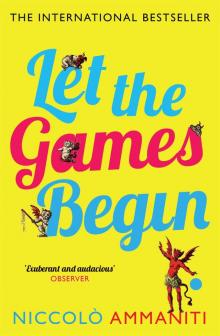 Let the Games Begin
Let the Games Begin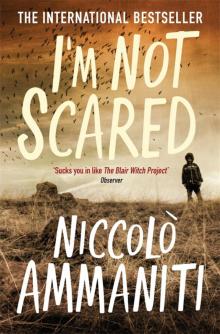 I'm Not Scared
I'm Not Scared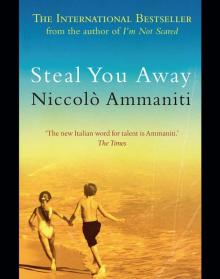 Steal You Away
Steal You Away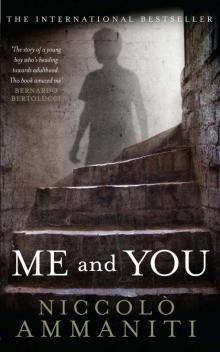 Me and You
Me and You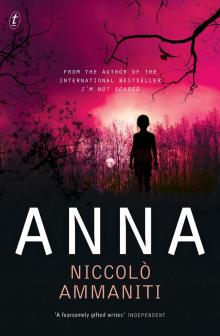 Anna
Anna